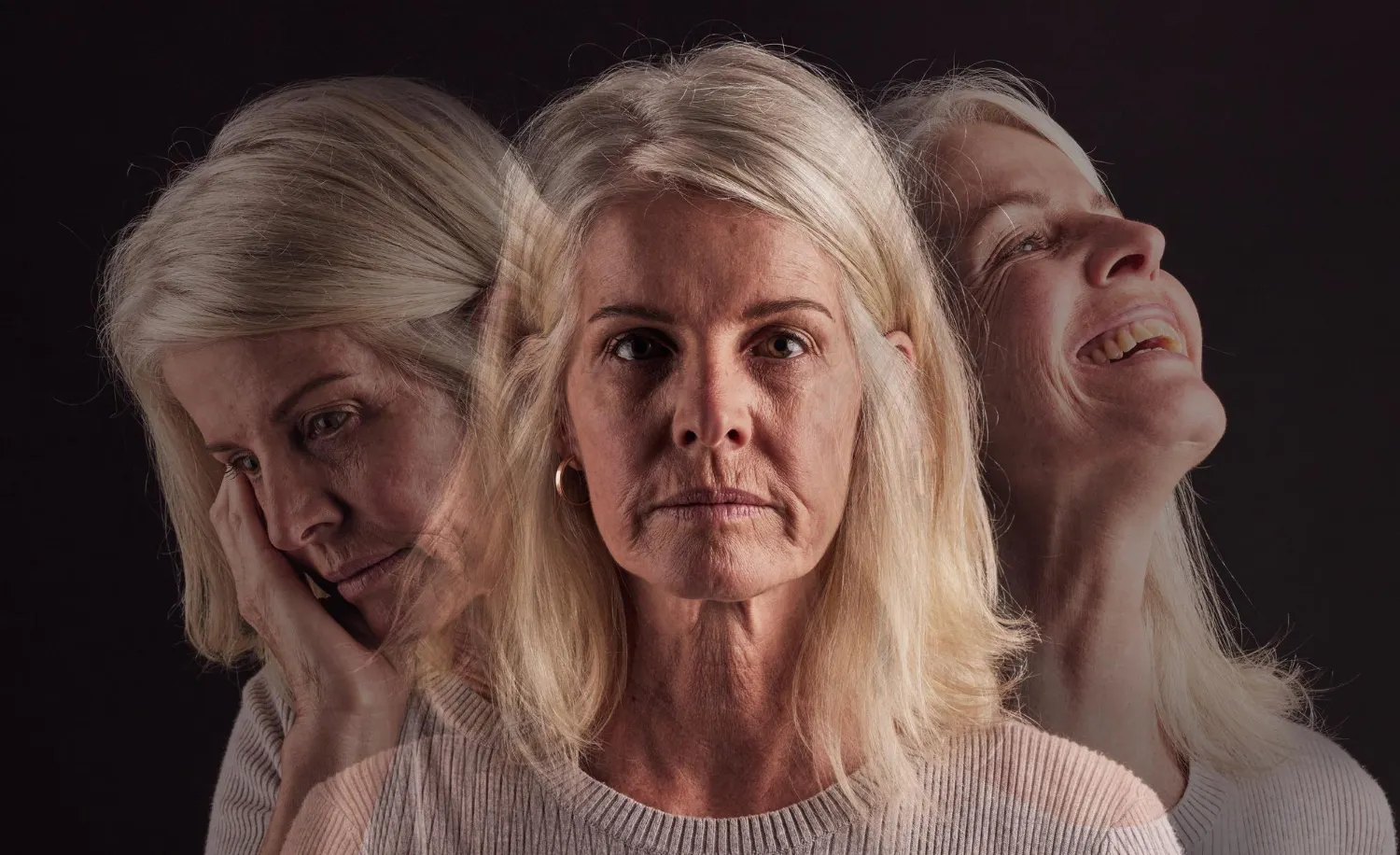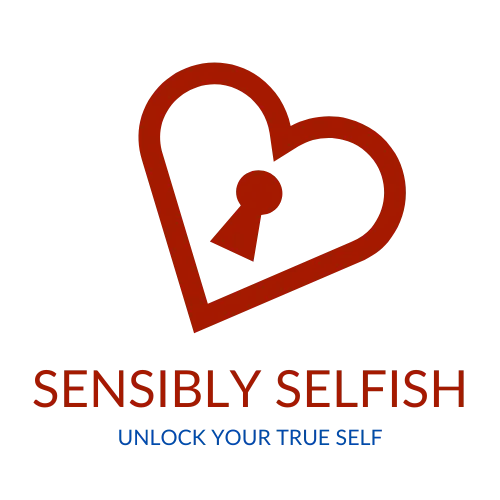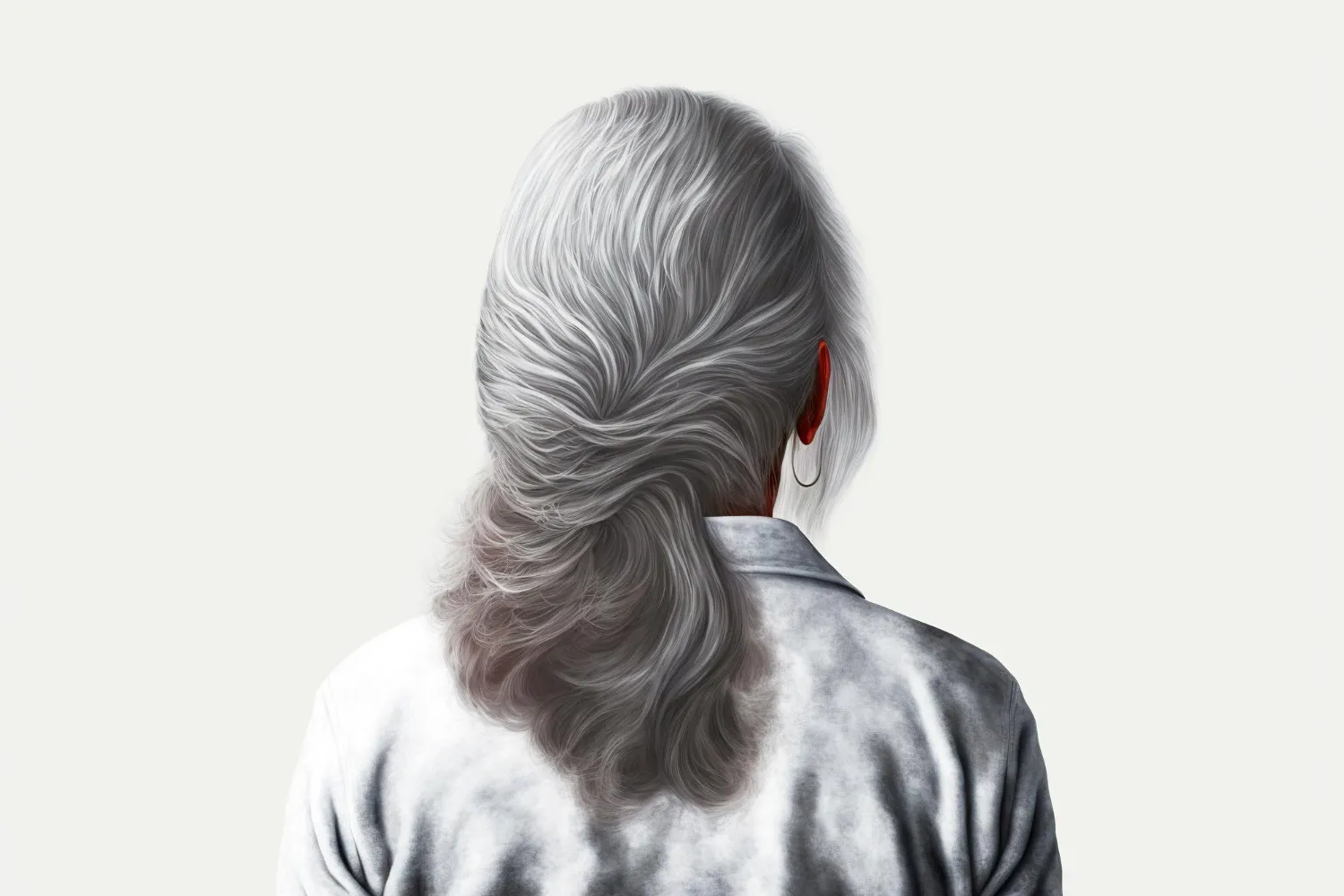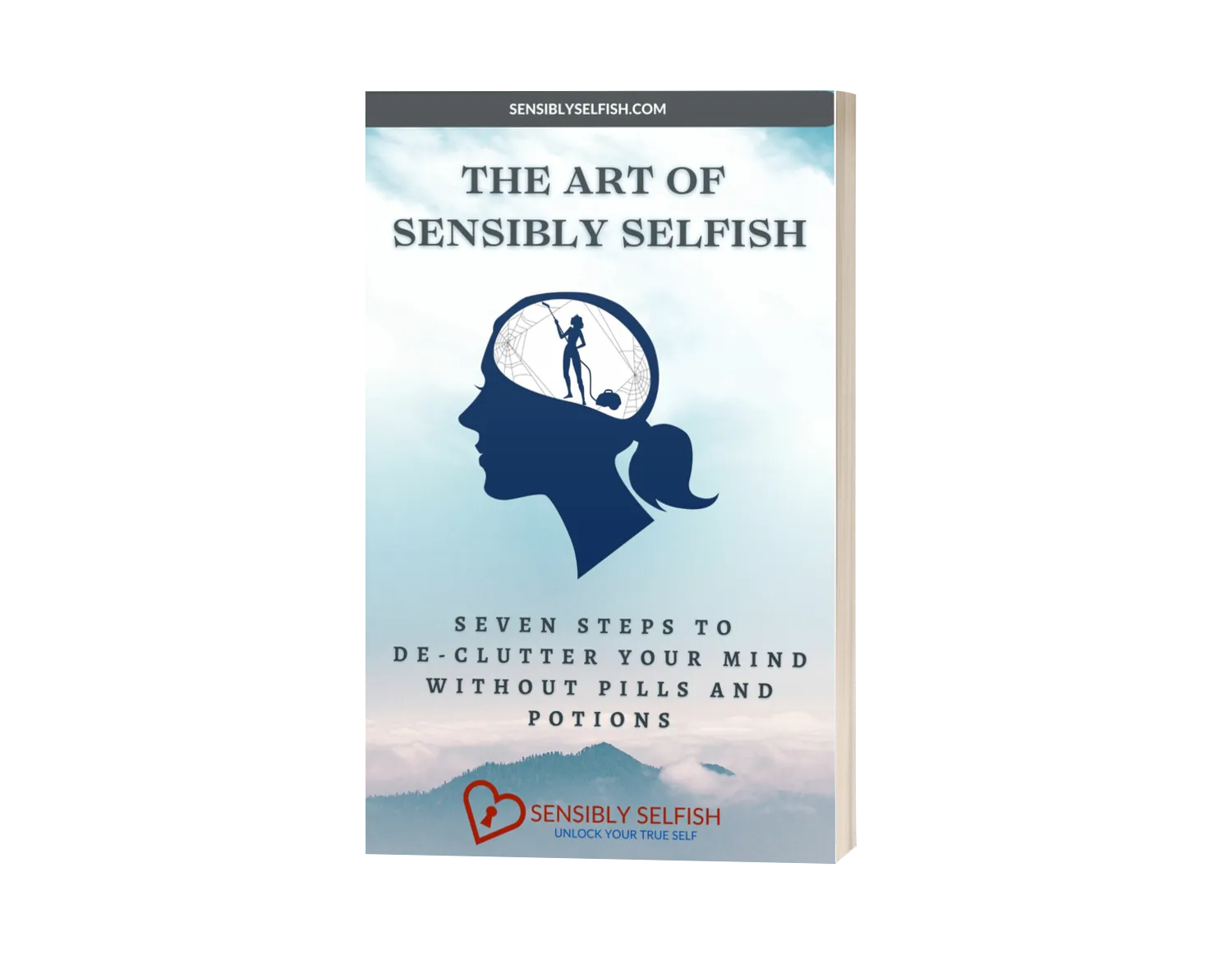Blame, Judgment, and Criticism
Finding Self-Compassion Amidst Critique
[Toc]

In the tapestry of life, blame, judgment, and criticism are threads that weave themselves into our thoughts and interactions. For women over 45, these challenges can become particularly intricate, shaping their self-perception and affecting their well-being. Have you ever found yourself caught in the web of self-blame, scrutinizing every decision you make? Or felt the weight of societal judgment pressing on your shoulders as you walk the path of aging gracefully? Do you know that there's a sensibly selfish approach to not only addressing these challenges but also thriving beyond them?
In this article, we delve deep into the intricacies of these challenges that women over 45 often face. We'll explore the sources of blame, the weight of societal expectations, the insidiousness of self-criticism, and most importantly, the strategies to overcome them. From mindful self-compassion practices to setting empowering boundaries, each section offers actionable insights and exercises to empower you on your journey of growth. So, if you're ready to liberate yourself from the shadows of negativity and embrace a sensibly selfish mindset that uplifts and empowers, join us on this transformative exploration. Let's unravel the threads of blame, judgment, and criticism and weave a new narrative of self-compassion and resilience together.

The Anatomy of Blame, Judgement, and Criticism
Self-criticism is a common psychological phenomenon that involves being excessively harsh and negative towards oneself. Women, in Modern Western Society, seem to suffer more than men. Below you will find a meaning of blame, judgment, and criticism can you resonate with the character portrayed?
Blame
Blame involves the act of attributing faults, whether directing them outwardly or turning them inwardly, creating a web of emotions that can lead to overwhelming feelings of guilt, self-doubt, and inadequacy. Imagine a woman named Emily who recently received feedback at work about a project she had been working on. Despite the feedback being constructive and aimed at improvement, Emily's immediate reaction was to blame herself for not meeting all the expectations. She began to internalize the criticism, questioning her skills and competency, which led to a spiral of self-doubt and feelings of inadequacy. In this scenario, blame turned inward and morphed into self-criticism, illustrating how easily external feedback can trigger a cycle of negative emotions.
Judgement
Judgment, on the other hand, emerges as a result of external evaluations, where others assess our decisions and actions through the lens of their standards and beliefs. This evaluation can be particularly pronounced for women over 45, as societal norms often dictate how they should lead their lives. For instance, Sarah, a woman in her late 40s, decided to pursue a new career path that ignited her passion. However, friends and family questioned her decision, citing concerns about stability. Their judgments, rooted in conventional expectations, inadvertently made Sarah second-guess her choice, highlighting how external assessments can impact one's self-confidence and sense of fulfillment.
Criticism
Criticism takes this evaluation a step further by not only assessing our choices but also emphasizing perceived flaws and shortcomings. These critical viewpoints can stem from a variety of sources, including societal expectations, personal relationships, and even our internal dialogue. Consider Jane, a woman over 45 who embarked on a fitness journey to improve her health. As she shared her progress on social media, she encountered comments from acquaintances pointing out areas where she still fell short. These criticisms, although unsolicited, tapped into her existing insecurities about her body image and age. This example underscores how criticism, whether from external sources or our inner thoughts, has the potential to magnify perceived imperfections and affect our self-esteem. Women over 45 need to recognize and manage these influences to maintain a positive self-image and sense of empowerment.
"You have been criticizing yourself for years, and it hasn't worked. Try approving of yourself and see what happens." - Louise Hay

The difference between criticism and feedback
The distinction between criticism and feedback lies in their intent and impact. Feedback is constructive input that aims to facilitate growth and improvement. It is rooted in a desire to help, offering specific observations and suggestions to aid in refining skills or approaches. Feedback is often well-intentioned and focuses on the task or behavior at hand rather than attacking the individual's character.
On the other hand, criticism tends to be more negative, highlighting perceived faults and shortcomings without providing actionable insights. Unlike feedback, which is geared towards fostering positive change, criticism can erode self-esteem and create defensiveness. For women over 45, discerning between the two is crucial; embracing constructive feedback can contribute to personal development while learning to filter out unwarranted criticism protects emotional well-being.
Societal Pressures and Expectations
Societal norms exert a powerful force on how women perceive themselves and their values. As women age, they often encounter a barrage of expectations that prescribe how they should look, act, and achieve. Media portrayal of youth and beauty can lead to feelings of inadequacy and a tendency to internalize blame when one doesn't conform to these ideals. The pressure to maintain a youthful appearance can be particularly acute, causing women over 45 to feel scrutinized and judged.
The Role of Internal Criticism
Internal criticism is a formidable adversary that often amplifies external negativity. Women are experts at turning their inner voices into harsh critics, berating themselves for perceived shortcomings. This internal dialogue perpetuates feelings of unworthiness and self-doubt. Imagine a scenario where a woman receives constructive feedback. Instead of considering it objectively, she may internalize it as a reflection of her incompetence. This pattern of self-criticism undermines confidence and inhibits personal growth.
"No one can make you feel inferior without your consent." - Eleanor Roosevelt
[CTA]
Case Story - Amanda's Selfish Success
Amanda, a vibrant woman in her late 40s, had always been entangled in a web of blame, judgment, and criticism. The pattern was particularly evident in her relationship with her husband, known for his patience and kindness. Despite his angelic nature, Amanda couldn't help but focus on his imperfections, magnifying minor flaws into significant issues.
One day, while sitting with her friends around the coffee table, Amanda experienced a moment of clarity that would change her life. As her friends engaged in gossip and negativity, she suddenly realized the toxic cycle she was perpetuating. Amanda had been unconsciously feeding off the negative energy of her friends, and in turn, she was perpetuating the very behaviors she wanted to overcome.
This realization was a turning point for Amanda. She recognized that her environment was influencing her thoughts and actions, and she knew it was time for a change. Gradually, she started distancing herself from the negative interactions and cultivating connections that aligned with her desire for positivity and growth.
Amanda's journey wasn't without challenges. She faced moments of self-doubt and had to consciously redirect her thoughts away from blame and judgment. She began seeking out like-minded individuals who shared her commitment to personal development and empowerment. Engaging in meaningful conversations and shared activities with her new circle of friends allowed Amanda to break free from the cycle of blame and criticism.
Over time, Amanda noticed remarkable shifts in her life. Her relationship with her husband transformed as she started appreciating his virtues and focusing on the love they shared. Her newfound connections uplifted her spirits and inspired her to pursue long-forgotten passions. Amanda's journey toward self-awareness and positive change not only improved her relationship but also enhanced her overall well-being.
Amanda's story serves as a powerful reminder that surrounding oneself with positive influences and making conscious choices can lead to transformative outcomes. Her journey from blame and judgment to self-awareness and empowerment demonstrates that by changing our perspectives and connections, we can shape a more fulfilling and joyful life.

Breaking Free from the Cycle
Recognizing the negative impact of blame, judgment, and criticism is the first step toward breaking free from their grip. Self-awareness allows women to acknowledge when these influences are affecting their emotional well-being. It's essential to differentiate between valid feedback and baseless criticism. Below are a few strategies you can use to break free:
Mindfulness and Self-Reflection: Engaging in mindfulness practices, such as meditation or deep breathing, can help women become more attuned to their thoughts and emotions. This heightened self-awareness allows them to recognize when blame, judgment, or self-criticism is arising and enables them to address these feelings at the moment.
Positive Affirmations: Incorporating positive affirmations into daily routines can counteract the negative self-talk that often accompanies blame and criticism. Repeating affirmations that emphasize self-worth and resilience can help reshape one's internal dialogue and foster a more compassionate mindset.
Surrounding Yourself with Positivity: Actively seeking out positive and supportive influences is essential. This could involve spending time with friends who uplift and encourage, engaging in hobbies that bring joy, or consuming media that promotes self-acceptance and growth.
Professional Guidance: Seeking therapy or counseling provides a safe space to explore and address underlying issues that contribute to blame, judgment, and criticism. A trained therapist can offer guidance on building coping mechanisms and developing a healthier self-image.

Challenging Negative Thoughts: Practice cognitive reframing by questioning the validity of negative thoughts. Encourage yourself to ask whether self-critical beliefs are based on facts or assumptions. This process can help replace destructive thoughts with more balanced and realistic perspectives.
Intention Setting and Achievements: Setting achievable goals and celebrating accomplishments can boost self-confidence. By focusing on personal growth and achievements, you can shift your attention away from external criticism and channel energy into positive endeavors.
Limiting Exposure to Negativity: You can curate your social media feeds and interactions to minimize exposure to toxic environments or individuals who perpetuate criticism and judgment. Surrounding oneself with positivity online can significantly impact emotional well-being.
Learning to Accept Imperfections: Embracing imperfections as a natural part of being human is a powerful antidote to the perfectionism that often fuels self-criticism. Understanding that everyone makes mistakes and has flaws can alleviate the burden of unrealistic expectations.
Fostering Resilience Through Adversity: View challenges as opportunities for growth rather than reasons for blame. Developing resilience and adaptability in the face of adversity can strengthen their self-confidence and ability to navigate criticism.
Empowering Self-Evaluation: Encouraging women to evaluate themselves based on their values, passions, and personal progress rather than external measures can diminish the impact of societal judgment and criticism.

Journaling Towards Joy
Writing is a useful strategy to document emotions and identify patterns and gain perspectives. Journaling experiences, and practicing self-compassion involves treating oneself with the kindness and understanding they would extend to a friend facing similar challenges. When you write with your hand, it connects your head and heart. Take a look at the prompts below to start the writing process, you may find it useful to have a dedicated journal for reference purposes.
Journal Prompts
Reflect on a Recent Self-Critical Thought: Write about a recent moment when you felt self-critical. Describe the situation, the thoughts that arose, and how they made you feel. Then, reframe these thoughts from a place of self-compassion and write down a more balanced perspective. Now you can decide if this new perspective is for you.
Identify Supportive Influences: List the people and activities in your life that bring positivity and support. How do these influences make you feel? How can you prioritize spending more time with them to counteract negativity?
Boundary-Setting Reflection: Reflect on a situation where you felt overwhelmed by external criticism or judgment. Describe how setting boundaries might have protected your well-being at that moment. How can you implement boundaries moving forward?
Embrace Imperfections: Write about a perceived imperfection you've been critical of. Consider how this imperfection makes you unique and what positive qualities it might bring into your life. How can you learn to embrace it as a part of your identity?
Goal Celebration: List three achievements you're proud of, no matter how small. Describe the feelings these accomplishments evoke and how they contribute to your overall sense of self-worth.
Future Resilience: Visualize a future scenario where you receive criticism or face judgment. How can you respond with resilience and self-assuredness? Write down the thoughts and actions you would engage in to protect your emotional well-being.
By employing a combination of these journaling strategies, you can gradually reduce the influence of blame, judgment, and criticism and pave the way for greater self-acceptance and emotional well-being.

Building Resilience and Confidence
In a world rife with external pressures, building resilience and confidence becomes a necessity. Women must embrace their individuality and reject the idea of a one-size-fits-all standard for success and appearance. Celebrating personal achievements, whether big or small, reinforces self-worth. Cultivating a support system of like-minded individuals who uplift and encourage growth can provide a buffer against external negativity. These relationships offer a safe space to share experiences, exchange advice, and reaffirm one's value.
Setting Boundaries
Setting healthy boundaries is a powerful tool for shielding oneself from the harmful effects of blame, judgment, and criticism. Boundaries protect emotional well-being by limiting exposure to negative influences. Communicating these limits assertively and respectfully reinforces self-respect and communicates the expectation of mutual respect. Boundaries also extend to the relationship one has with oneself. Learning to say no to self-deprecating thoughts and redirecting them towards self-affirmation bolsters emotional resilience.
"Do not bring people in your life who weigh you down. And trust your instincts - good relationships feel good. They feel right. They don't hurt." - Oprah Winfrey

Embracing a Sensibly Selfish Mindset
Embracing a sensibly selfish mindset is a radical act of self-preservation. Prioritizing self-care is not selfish; it's an investment in overall well-being. Women over 45 often find themselves juggling numerous responsibilities – family, career, community – and their own needs can get lost in the shuffle. However, when they put their well-being at the forefront, they become better equipped to navigate the challenges that come their way. Engaging in activities that bring joy, practicing mindfulness, and pursuing hobbies reignite a sense of purpose and remind women of their intrinsic value.
Remember, this journey isn't a solo endeavor. Sharing experiences, offering support, and forming connections with other women can create a supportive community where empowerment thrives. So, let's start a conversation – share your insights, tips, and stories in the comments below, and let's uplift each other on this path to personal growth and self-discovery.
Practical Exercises
Creating a personal space for reflection and growth allows you to apply the concepts discussed in this blog post, fostering a sense of empowerment and self-discovery.
Mindful Self-Compassion Practice: Set aside 10 minutes each day to practice self-compassion. Close your eyes, take deep breaths, and focus on sending kind and understanding thoughts to yourself. Reflect on a recent situation where you blamed yourself, and explore how you can offer yourself the same compassion you would give a friend.
Boundaries Visualization: Visualize a protective bubble around yourself. Imagine this bubble as a shield that filters out external negativity and criticism, allowing only positivity and self-affirmation to enter. Spend a few minutes each day imagining yourself in this protective space.
Affirmation Crafting: Create a list of positive affirmations that counteract self-criticism. For example, "I am resilient," "I am deserving of love and respect," or "I embrace my uniqueness." Write these affirmations on sticky notes and place them in visible areas where you can see them daily.

Defeating Your Adversaries
Blame, judgment, and criticism can be formidable adversaries that affect women over 45. By acknowledging these challenges and implementing strategies to counteract their influence, women can reclaim their self-worth and lead fulfilling lives beyond societal expectations. Through self-awareness, self-compassion, resilience-building, boundary-setting, and a sensibly selfish mindset, women can emerge from the shadows of negativity and embrace their authentic selves.
"The only way to deal with critics is to keep on being you with even more intensity." - Kimora Lee Simmons
Now, it’s over to you. We would love to know your thoughts and hear your inspirational stories.









